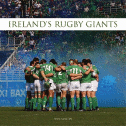 |

|
|||
|
Ireland's Rugby Giants: Willie AndersonOff the pitch there are few people who are better company than Willie Anderson. Apart from the bone-crushing handshake, he is affable, humorous, opinionated and passionate about his rugby and always buys his round. Well – almost always. “I remember when I won my first cap for Ireland,” laughs Willie. “My father gave me a fifty punt note to buy a drink after the game. Every time I tried to use it someone would say ‘Here’s a pint for you Willie, don’t be breaking that’.” Anderson had waited a long time for that first Ireland cap against Australia in Dublin in the autumn of 1984. He was twenty-nine. It is to his credit that he carved out an international career starting at that age. He played the last of his twenty-seven games just short of his thirty-fifth birthday. Nobody was prouder of wearing the green of Ireland. It was something he had wanted to do since childhood in the Tyrone village of Sixmilecross. “I can still feel the tingle that went down my spine when I first heard the national anthem at Lansdowne Road as an Ireland player,” he recalls. “Some may find that difficult to understand from an Ulster Protestant. But it was such an honour. The ultimate one was actually captaining your country. That was very special.” Anderson’s international career was delayed due to a much-misreported incident involving a national flag in Argentina. In truth it was the sort of ‘boys on tour’ jape that happens wherever young sportsmen gather. The Argentinean authorities over-reacted in the most highhanded fashion. Their ridiculous macho stance made them an international laughing stock – ‘toy soldiers’ with no class. But it was no laughing matter for Anderson who was detained for almost three months, made aware that two generals amongst the Argentinean junta wanted him executed, and was more than £10,000 out of pocket by the time he returned home. Effectively the incident made him an international pariah as far as the Ireland selectors were concerned. But he continued to perform a key role for the rampant Ulster provincial side which dominated the game in Ireland at that time. His mentors there were Harry Williams and Jimmy Davidson who would later become Ireland coach. The Ulster side was packed with special players who were disciples of the strict fitness regime laid down by the coaches. They included wingers Trevor Ringland and Keith Crossan, flankers Nigel Carr and Phil Matthews, Lions centre David Irwin and a plethora of others. “There is no doubt that Ulster provided the platform from which my international career was eventually launched,” says Willie frankly. “It was a very special group of players and I would go so far as to say that we were one of the best provincial sides in the world at that time. The players were dedicated and in great physical shape. Nigel Carr for example was probably fitter than some full-time professional players are today. They were a special group, full of talented individuals. Who can forget the murmur of expectancy that used to buzz around Ravenhill when Keith Crossan, such a brave little player, took a pass at speed and headed for the line?” All these players were to be part of the Ireland team during Anderson’s time as player and skipper. As indeed was Jimmy D. “Jimmy D really was years ahead of his time,” suggests Willie. “Many of his ideas from twenty years ago are now standard practice in professional rugby. One of his greatest strengths was his ability to think outside the box. One of the most famous examples of that was when we eyeballed the All Blacks as they did the Haka. Jimmy D’s reasoning there was simple. With this spectacle just before kick-off New Zealand always seized the initiative. Our action was not a sign of any disrespect – it was an attempt to get the crowd on our side rather than theirs at the start of the game.” In 1985 Ireland won the Triple Crown under Mick Doyle. Anderson admits he “enjoyed playing under him. He was innovative, especially in his first year.” After that it was a case of ‘if it ain’t broke don’t fix it’. But in 1985 Anderson believes Ireland blew the chance of even greater glory. “We were in a commanding position against the French in Dublin and allowed them back into the game for a 15-15 draw. We won the Triple Crown and the championship though.” That draw with France cost the class of 1985 a historic Grand Slam, something that had not been achieved since the Jack Kyle era. However it has become part of the folklore of Irish rugby for an entirely different reason: a banner. The French had a second row called Jean Condom who was immortalised on it. The banner bore the legend ‘Our Willie Is Bigger Than Your Condom’. Since he stopped playing Anderson has proven to be an adept coach. He led Dungannon to an All Ireland League title in the 2000-01 season when he was Director of Rugby there. He has also coached for the IRFU and in the Irish provinces, and was assistant to Matt Williams during his tenure as Scotland’s rugby supremo. While admitting that the game has changed Anderson is not one of those former players who bitterly proclaims the game was better in their day. He tips his hat to the success of the World Cup, the Heineken Cup, noting that the 2007 final between Wasps and Leicester drew a crowd of 89,000. He also salutes the success of the Irish provinces in European competition. But he also fears for the club game in Ireland, noting the demise of the Antrim club and flagging up the need to spread the recruitment net wide for the game to survive at that level. While some berate the modern game for an overemphasis on defence, Anderson remains optimistic. “When I see the All Blacks in full flight it is still a joy to behold,” he smiles. “They are fluid, they off-load quickly, there is movement. It is the sort of game Jimmy D would have loved.” Anderson’s face lights up when he remembers the great man and the great days. But he remains a man with an eye to the future. Undoubtedly that future will involve rugby for as long as big Willie draws breath.
.
|
[ Back to top ]
All Material © 1999-2006 Irelandseye.com and contributors

